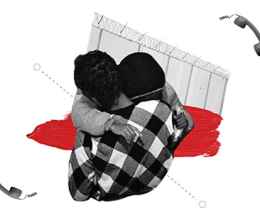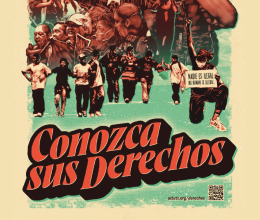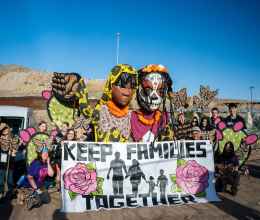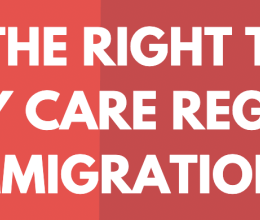
The world today is full of uncertainty caused by the COVID-19 pandemic weighing on people's minds. Across the U.S., people are panic shopping for toilet paper and understanding the need for social distancing.
Yet our society is largely ignoring the life-threatening risk to some of the people most vulnerable to viral spread — people jailed in the network of immigration detention facilities that exist in the U.S.
It’s a looming crisis that the Department of Homeland Security (DHS) knows about and is fundamentally unprepared for: the threat of COVID-19 spreading throughout its detention centers. DHS has largely chosen to ignore the problem — failing to provide adequate medical care to those exhibiting symptoms of COVID-19, or even inform detained individuals that a global pandemic exists.
It has long been documented that DHS subjects people to inhumane conditions inside Immigration and Customs Enforcement (ICE) and Customs and Border Protection (CBP) detention facilities. Now, these inhumane conditions are creating a timebomb for a viral outbreak. DHS has proven itself incapable of handling this problem — they lack the expertise, equipment, and training to deal with the COVID-19 outbreak.
To better understand the conditions facing detainees right now, the ACLU of Texas worked with our partners who are directly representing people in immigration jails, including Las Americas, RAICES, and Texas Rio Grande Legal Aid. The details they shared confirm a gruesome picture of a grossly inadequate response to the COVID-19 pandemic.
Despite the urgent insistence of public health officials, thousands of people in ICE and CBP facilities are being denied basic protections to combat COVID-19, even access to soap to wash their hands in some instances. We have heard many more disturbing stories in multiple facilities.
In a Border Patrol facility in El Paso, Texas, detainees are unable to follow current social distancing guidelines, are often given one square of toilet paper per use, and have a single soap dispenser for six sinks. People with visible flu-like symptoms are crammed into rooms with more than 150 detainees.
People inside the Port Isabel Detention Center in Texas’ Rio Grande Valley are forced to pay for their own soap while the global pandemic rages. ICE officers do not wear any masks or gloves, and the phones detainees are forced to use in order to speak with loved ones or their attorneys are not regularly cleaned.
In the Rio Grande Detention Center in Laredo, Texas, people being held in detention state they have gone more than a week without any access to soap, that ICE officers do not wear masks or gloves, and that detained individuals are forced to stay in dangerously overcrowded rooms.
At the South Texas ICE Processing Center in Pearsall, Texas, sick people have not been tested for flu or COVID-19 and have not had their temperatures taken, and they have not been separated from healthy detained people. No tissues or hand sanitizer are available. Like other immigration jails, there is no way for detainees to socially distance.
From these first-hand accounts, it is clear that DHS is at best unprepared, and at worst unwilling, to provide basic protections to the thousands of detainees it chooses to hold in detention.
These collective stories are the reasons why the ACLU of Texas has filed several complaints, linked below, with the DHS Office of the Inspector General (the internal watchdog agency overseeing CBP and ICE) demanding for the immediate investigation into these detention conditions throughout the state and the release of all those detained.
COVID-19 is an urgent threat to people who remain inside immigration jails throughout Texas. DHS must immediately act to protect the health and safety of those detained and improve the conditions in its jails. They must ensure people have adequate access to medical care, soap, and hygiene products and that they have access to information about the pandemic.
Without immediate action to release people in detention, a devastating COVID-19 outbreak — in which many people will become gravely ill and some will die — is all but assured. DHS should do the right thing and make sure that detained immigrants are given the same fighting chance that others in the U.S. have to survive this pandemic.






